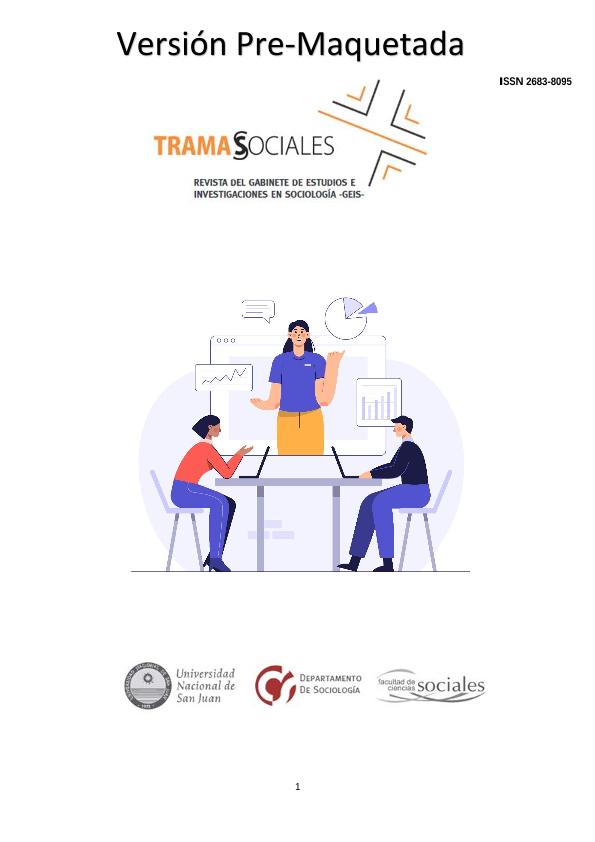Mostrar el registro sencillo del ítem
dc.contributor.author
Obradovich, Gabriel

dc.contributor.author
Donatello, Luis Miguel

dc.date.available
2023-11-06T14:15:55Z
dc.date.issued
2020-09
dc.identifier.citation
Obradovich, Gabriel; Donatello, Luis Miguel; Las transformaciones recientes en la Unión Cívica Radical: Renovación partidaria, polarización política y oposición al kirchnerismo (2008-2015); Gabinete de Estudios e Investigaciones en Sociología; Tramas Sociales; 3; 3; 9-2020; 165-191
dc.identifier.issn
2683-8095
dc.identifier.uri
http://hdl.handle.net/11336/217118
dc.description.abstract
En las elecciones nacionales de noviembre de 2015, la coalición Cambiemos, integrada por la Unión Cívica Radical, la Coalición Cívica y Propuesta Republicana, se impuso a Daniel Scioli, el candidato representante del kirchnerismo. Para muchos analistas, fue sin duda sorpresivo que una fuerza de centroderecha, que solo gobernaba en dos distritos importantes, hubiera logrado conquistar el poder. En la coyuntura electoral, fue fundamental que la UCR como partido nacional le proporcionara al PRO una estructura territorial para favorecer dicho triunfo. ¿Cómo entender la alianza entre la UCR y el partido de Mauricio Macri cuando, en los años anteriores, diferentes líderes partidarios habían manifestado su rechazo al PRO y a la posibilidad de que el radicalismo apoyara a un partido de derecha? Para comprender el proceso que posibilitó la conformación de Cambiemos, en este trabajo se indaga, por un lado, sobre los cambios y reconfiguraciones internas del partido y, por el otro, sobre el modo en que el proceso de polarización política afectó la dinámica interna del radicalismo, particularmente luego del conflicto agrario de 2008. Retomando estas dimensiones nos preguntamos: ¿qué transformaciones internas atravesó la UCR en los primeros años del kirchnerismo y con qué claves discursivas se posicionó frente al gobierno? ¿De qué manera el creciente marco de polarización política afectó la reorganización partidaria interna y contribuyó a la formación de la coalición Cambiemos?
dc.description.abstract
In the national elections of November 2015, the Cambiemos coalition, made up of the Radical Civic Union, the Civic Coalition and the Republican Proposal, prevailed over Daniel Scioli, the representative candidate of Kirchnerism. For many analysts, it was undoubtedly surprising that a center-right force, ruling only two major districts, had managed to seize power. At the electoral juncture, it was essential that the UCR as a national party provide the PRO with a territorial structure. How to understand the alliance between the UCR and Mauricio Macri's party when, in previous years, different party leaders had expressed their rejection of the PRO and the possibility that radicalism supported a right-wing party? In order to understand the process that made possible the formation of Cambiemos, this work investigates, on the one hand, the changes and internal reconfigurations of the party and, on the other, the way in which the process of political polarization affected the internal dynamics of the UCR party, particularly after the agrarian conflict of 2008. Returning to these dimensions, we ask ourselves: what internal transformations did the UCR go through in the early years of Kirchnerism and with what discursive keys did it position itself against the government? How did the growing framework of political polarization affect internal party reorganization and contribute to the formation of the Cambiemos coalition?
dc.format
application/pdf
dc.language.iso
eng
dc.publisher
Gabinete de Estudios e Investigaciones en Sociología
dc.rights
info:eu-repo/semantics/openAccess
dc.rights.uri
https://creativecommons.org/licenses/by-nc-sa/2.5/ar/
dc.subject
UCR
dc.subject
POLARIZACIÓN
dc.subject
kIRCHENRISMO
dc.subject
RADICAL
dc.subject.classification
Sociología

dc.subject.classification
Sociología

dc.subject.classification
CIENCIAS SOCIALES

dc.title
Las transformaciones recientes en la Unión Cívica Radical: Renovación partidaria, polarización política y oposición al kirchnerismo (2008-2015)
dc.title
Recent transformations in the Radical Civic Union: Party renovation, political polarization and opposition to kirchnerism (2008-2015)
dc.type
info:eu-repo/semantics/article
dc.type
info:ar-repo/semantics/artículo
dc.type
info:eu-repo/semantics/publishedVersion
dc.date.updated
2023-11-06T09:53:10Z
dc.journal.volume
3
dc.journal.number
3
dc.journal.pagination
165-191
dc.journal.pais
Argentina

dc.journal.ciudad
San Juan
dc.description.fil
Fil: Obradovich, Gabriel. Universidad Nacional del Litoral. Instituto de Humanidades y Ciencias Sociales del Litoral. Consejo Nacional de Investigaciones Científicas y Técnicas. Centro Científico Tecnológico Conicet - Santa Fe. Instituto de Humanidades y Ciencias Sociales del Litoral; Argentina
dc.description.fil
Fil: Donatello, Luis Miguel. Universidad Nacional del Litoral. Facultad de Humanidades y Ciencias; Argentina. Universidad de Buenos Aires; Argentina. Consejo Nacional de Investigaciones Científicas y Técnicas. Oficina de Coordinación Administrativa Saavedra 15. Centro de Estudios e Investigaciones Laborales; Argentina
dc.journal.title
Tramas Sociales
dc.relation.alternativeid
info:eu-repo/semantics/altIdentifier/url/http://www.ojs.unsj.edu.ar/index.php/tramassociales/article/view/660
Archivos asociados
